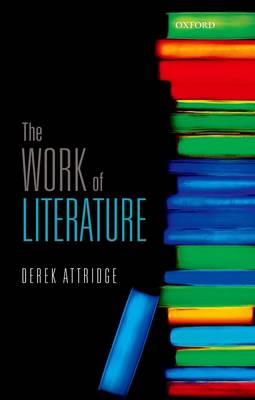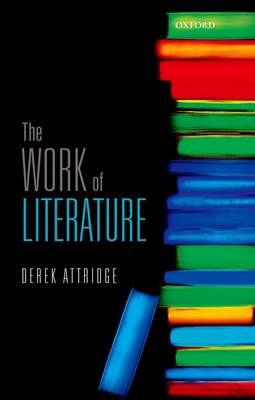
- Retrait gratuit dans votre magasin Club
- 7.000.000 titres dans notre catalogue
- Payer en toute sécurité
- Toujours un magasin près de chez vous
- Retrait gratuit dans votre magasin Club
- 7.000.0000 titres dans notre catalogue
- Payer en toute sécurité
- Toujours un magasin près de chez vous
Description
What is distinctive about the cultural practice called 'literature'? How does it benefit individuals and society? How do literary works retain their importance and their capacity to give pleasure over decades and centuries? What constitutes responsible criticism? These are some of the questions addressed in this book, which develops the arguments put forward in Derek Attridge's influential study The Singularity of Literature (2004). Beginning with an extended cross-examination in the form of an interview addressing a range of topics relating to the work of literature (understood both as the activity of the writer and as the text itself) and the practices of literary reading and literary criticism, it asks what it means to 'do justice to' a work of literature, provides a full account of the concept of singularity, considers the problematic power of criticism, and advances an account of the role of context in the writing and reading of literary works. In other chapters it explores
the issue of cultural difference in responses to literature, discusses the working of metaphor, questions the attribution of knowledge to literary works, and addresses the topics of affect and hospitality. The book follows through the consequences of regarding the singular and inventive work of literature as an event that takes place anew each time it is read, providing an opening to an otherness excluded by prevailing cultural norms and habits of thought and feeling. Although the focus of the book is on literature, the arguments are relevant to all the arts, and engage with the thought of major aesthetic theorists in a number of traditions.
the issue of cultural difference in responses to literature, discusses the working of metaphor, questions the attribution of knowledge to literary works, and addresses the topics of affect and hospitality. The book follows through the consequences of regarding the singular and inventive work of literature as an event that takes place anew each time it is read, providing an opening to an otherness excluded by prevailing cultural norms and habits of thought and feeling. Although the focus of the book is on literature, the arguments are relevant to all the arts, and engage with the thought of major aesthetic theorists in a number of traditions.
Spécifications
Parties prenantes
- Auteur(s) :
- Editeur:
Contenu
- Nombre de pages :
- 336
- Langue:
- Anglais
Caractéristiques
- EAN:
- 9780198798903
- Date de parution :
- 24-10-17
- Format:
- Livre broché
- Format numérique:
- Trade paperback (VS)
- Dimensions :
- 213 mm x 140 mm
- Poids :
- 453 g

Les avis
Nous publions uniquement les avis qui respectent les conditions requises. Consultez nos conditions pour les avis.






